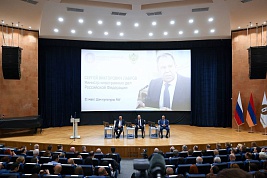Transcript of Remarks by Russian Minister of Foreign Affairs Sergey Lavrov at the Udmurt Republic Presentation Ceremony, Moscow, December 10, 2008
Esteemed Aleksandr Aleksandrovich [Volkov],
Esteemed Colleagues,
Your Excellencies,
Ladies and Gentlemen,
Friends,
It gives us great pleasure to once again hold the presentation of one of Russia's regions, the Udmurt Republic in this case, at our House of Receptions. I want to greet the leader of the Republic, officials of federal and regional government bodies, representatives of the diplomatic corps, Russian and foreign business circles and, of course, members of the media.
Russia is truly rich in unique places and one of them is Udmurtia, which lies at the juncture of Europe and Asia and strikes one by its primordial beauty. It is enough to look at the stunning landscapes which are displayed at the present exposition. Udmurtia is often called a land of springs – the more than 7 thousand springs give rise to many rivers, including such ancestral Russian rivers as the Vyatka and Kama. I was told that there is an Udmurt saying that a river without springs quickly grows shallow and this is, of course, an absolute truth which is applicable to geography and to the physical state of water bodies, but also has a figurative meaning: more than 130 nationalities that inhabit the Russian Federation live in Udmurtia. This is one of Russia's most polyethnic, polyconfessional constituent entities and all through the history of Udmurtia one can make certain that the interaction, coexistence and mutual enrichment of different cultures and religious confessions is indeed a foundation, without exaggeration, of exemplary interethnic relations.
Many great sons of Russia are associated with Udmurtia – including Pyotr Ilyich Tchaikovsky (Aleksandr Aleksandrovich and I talked today about this). This is a part not only of Russian culture, but an integral component of world culture as well.
The fate of Udmurtia is inseparably connected with the fate of Russia. 450 years ago Udmurtia became part of the Russian state, and this anniversary date constituted a symbol of the new stage of prosperity of the Republic.
Today it occupies one of the worthy positions in the system of Russian federalism and is one of the most dynamically evolving regions in the broadest sense of the word. The Udmurt economy is a multi-branch complex, with a strong industrial potential, a developed agriculture and highly skilled manpower. Along with rich mineral reserves, of course, all this creates an excellent objective natural base for breakthrough actions. The republic under Aleksandr Volkov's leadership uses this up to the hilt. More than 400 industrial plants, and of what kind! Within the display set up here today one can see for himself that the enterprises concentrated in Udmurtia are truly high-tech facilities, not merely inherited from Soviet times, but constantly developing and maintaining a very high reputation by the most up-to-date world standards. The fact that the republic turns out virtually the full range of products – from consumer goods to space equipment – speaks volumes.
The city of Izhevsk is often called the capital of Russian gunsmiths. It produces the bulk or 80 percent by some estimates of the country's range of hunting guns and small arms. And of course, they are popular both at home and abroad. The products of Izhevsk gunsmiths have more than once helped our sportsmen win the highest honorable awards in European and international competitions. Mikhail Timofeyevich Kalashnikov is a legendary figure. Let us not forget that the Kalashnikov automatic rifle graces the national emblems of some foreign states. That's worth a lot, and any other small arms brand can hardly compete with the Kalashnikov. Unfortunately, now many are trying to manufacture Kalashnikov rifles without license. We are actively fighting this and striving to put an end to the illegal copying of this unique weapon.
Udmurtia actively interacts with the surrounding world. Based on federal laws, Udmurtia has adopted its own laws and regulations aimed at creating the most favorable investment climate. I think that the partners of Udmurtia, who are many, have fully appreciated the steps the republic's leadership has taken to foster mutually advantageous cooperation. The volume of trade with the foreign partners already exceeds, as far as I know, one billion dollars. All in all, the republic's partners in the world from among foreign states number more than ninety and it is very important that over 60 partners of Udmurtia buy products made in the republic. I am certain that today's presentation will enable all those wishing even more closely to familiarize themselves with the opportunities that are opening up in this republic with respect to economic and investment cooperation, cultural ties and tourism. Those not yet listed among Udmurtia's foreign partners I think ought to hurry up. This is a very promising part of the Russian Federation, which knows how to cooperate with partners, is proficient in doing that and sees perfectly well the advantages of participation in the international division of labor.
I wish Aleksandr Aleksandrovich Volkov and the entire Udmurt leadership every success and all the participants of the presentation – fruitful work and, most importantly, practical conclusions and results from what you will see and learn today.
December 11, 2008
